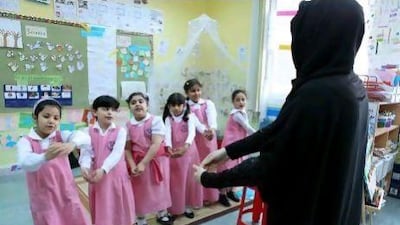DUBAI // Lack of an induction programme for new Emirati teachers is causing many to quit the profession before cutting their teeth, a study suggests.
Dr Ali S Ibrahim, of UAE University, found newly employed teachers suffered from stress, work overload and low self-esteem, which contributed to attrition rates.
"The prevalent view has been that new graduates from teacher education programmes are ready to fulfil their duties as teachers without support from schools or school districts," said Dr Ibrahim, who surveyed 100 teachers. "Young teachers feel like they are thrown into the water without a life jacket."
The Ministry of Education could not provide official figures for the new Emirati teacher attrition rate.
But international studies confirm that those with no formal induction are twice as likely to leave within the first three years of teaching.
Dr Ibrahim said that some of the most important learning needs of the novice teachers he interviewed included tips on managing a classroom, discipline and using different strategies to teach.
Amnah Al Kindi, 24, joined a Government high school in Fujairah last year. She has been struggling with the paperwork required and other tasks she was unprepared for.
"You do not know what their expectations are from you and the school is not always clear," said Ms Al Kindi, who plans to quit her job when she finishes her master's degree in education at HCT.
She said new teachers needed to be guided in tasks that they were not taught about at university.
"My principal is very supportive and new teachers have workshops," she said. "But we also need a mentor to tell us what is right and wrong and give us courage to continue."
Sameirah Abdouli, who graduated from HCT in Fujairah and teaches at a boys' school, said the regular practical training at university gave her a good idea of what was to come.
"This is not the case with other federal universities where there is very little training inside schools," said Ms Abdouli. "Some of the teachers I know are not motivated to stay on because they did not expect the work they are given."
Dr Ibrahim said a strong practical course had to be brought in at university level, but an induction programme could also help.
"All novice teachers should be assigned qualified mentors," he said.
An induction programme was tested in Abu Dhabi in 2004 but was shut down in 2008 because of several shortcomings.
Dr Ibrahim said his survey found that new teachers wanted experienced colleagues of the same sex to be their mentors, and for not more than a year.
Mentors and novices should also have reduced teaching loads to provide time for co-planning, and they must also receive money for counselling, the study suggests.
The Sheikh Saud bin Saqr Al Qasimi Foundation for Policy Research also piloted a mentor programme this year. Twelve experienced teachers were selected to undergo courses to support new teachers in March.
"Nine of those teachers will team up with a new teacher and spend at least an hour a week with them," said Charlotte Lamptey, project manager for teaching and learning at the foundation.
Dr Steven Bossert, dean of the College of Education at UAEU, said they were working with Adec and other education officials to develop an induction programme, too.

